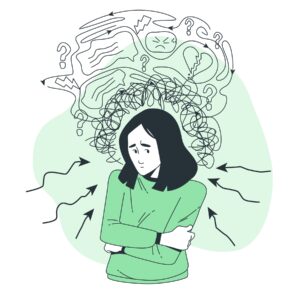Did you know that your gut could be influencing your mental health? The gut-brain connection is a concept that explores the link between digestion and mental well-being. This fascinating connection is gaining recognition in the field of health and wellness as researchers uncover the intricate relationship between the gut and brain.
The gut-brain connection is mediated by an extensive network of nerves and a vast community of microbes residing in our digestive system. Studies have shown that these gut microbes communicate with the brain, influencing our mood, behavior, and even cognitive function.
In this article, we delve into the latest research on the gut-brain connection and how it impacts our mental health. We’ll explore the role of gut microbes, the impact of stress on the digestive system, and actionable steps to promote a healthier gut-brain axis. Get ready to embark on a journey into the fascinating world of the gut-brain connection and discover the profound influence it has on our mental well-being.
Understanding the Digestive System
The digestive system is a complex network of organs responsible for breaking down food, absorbing nutrients, and eliminating waste. It starts in the mouth and ends in the rectum, with each organ playing a specific role in the digestion process. The stomach, small intestine, and large intestine are key players in nutrient absorption and waste elimination.

The gut is lined with a specialized layer of cells called the gut epithelium, which acts as a barrier between the digestive contents and the rest of the body. This barrier is essential for preventing harmful substances from entering our bloodstream. Additionally, the gut is home to a vast community of microbes known as the gut microbiome.
The gut microbiome is a diverse ecosystem of bacteria, viruses, fungi, and other microorganisms that live in our intestines. These microbes play a crucial role in digestion, nutrient absorption, and immune function. They also communicate with the brain through the gut-brain axis, influencing our mental well-being.
The Role of the Gut Microbiome
The gut microbiome is a hot topic of research in the field of gut-brain connection. Comprising trillions of microorganisms, the gut microbiome is unique to each individual and can be influenced by factors like diet, lifestyle, and medication use.
Research has shown that the gut microbiome has far-reaching effects on our overall health, including mental health. Certain gut microbes produce neurotransmitters like serotonin and gamma-aminobutyric acid (GABA), which are involved in regulating mood and emotions. These neurotransmitters are crucial for maintaining a positive mental state.
Additionally, the gut microbiome plays a role in the production of short-chain fatty acids (SCFAs), which have been linked to improved cognitive function and reduced symptoms of anxiety and depression. SCFAs act as signaling molecules, communicating with the brain via the gut-brain axis.
How the Gut Affects Mental Health?
The gut-brain connection is bidirectional, meaning that the gut influences the brain and vice versa. When the gut microbiome is imbalanced, it can lead to a condition known as dysbiosis, which is associated with various mental health disorders.

The gut-brain axis allows communication between the gut and brain through various pathways, including the nervous system, immune system, and endocrine system. Disruptions in these communication pathways can lead to a range of mental health issues, including anxiety, depression, and even neurodegenerative diseases like Alzheimer’s.
Furthermore, chronic inflammation in the gut, often caused by poor diet and lifestyle choices, can lead to increased permeability of the gut epithelium, commonly referred to as “leaky gut.” This allows harmful substances to enter the bloodstream, triggering an immune response and potentially affecting brain function.
Common Digestive Disorders and Their Impact on Mental Health
Several common digestive disorders can have a significant impact on mental health. Irritable bowel syndrome (IBS), for example, is a chronic condition characterized by abdominal pain, bloating, and changes in bowel habits. Research has shown a strong association between IBS and mental health disorders, such as anxiety and depression.
Similarly, inflammatory bowel diseases (IBD) like Crohn’s disease and ulcerative colitis have been linked to increased rates of anxiety and depression. The chronic inflammation and physical discomfort associated with these conditions can take a toll on mental well-being.
It’s important to note that while digestive disorders can contribute to mental health issues, the relationship between the gut-brain connection and mental health is complex and multifaceted. Various factors, including genetics, environment, and individual susceptibility, also play a role in the development of mental health disorders.
Strategies for Improving Gut Health
Maintaining a healthy gut is essential for optimizing both digestive and mental health. Fortunately, there are several strategies you can implement to support a healthy gut-brain axis.
- Diet and Nutrition: A balanced diet rich in fiber, fruits, vegetables, and fermented foods can promote a diverse and thriving gut microbiome. Avoiding processed foods, excessive sugar, and artificial additives can help reduce inflammation and support a healthy gut.
- Probiotics and Prebiotics: Probiotics are beneficial bacteria that can be consumed through supplements or fermented foods like yogurt and sauerkraut. Prebiotics, on the other hand, are indigestible fibers that serve as food for the beneficial bacteria in your gut. Including probiotics and prebiotics in your diet can help restore and maintain a healthy gut microbiome.
- Stress Management: Chronic stress can disrupt the gut-brain axis and contribute to digestive issues. Engaging in stress management techniques like mindfulness meditation, exercise, and adequate sleep can help reduce stress levels and support a healthy gut.
Diet and Nutrition for a Healthy Gut-Brain Connection

The saying “you are what you eat” holds true when it comes to the gut-brain connection. Your diet plays a crucial role in shaping the composition of your gut microbiome and influencing your mental well-being.
A diet rich in whole, unprocessed foods provides the necessary nutrients for a healthy gut microbiome. Fiber, in particular, acts as a prebiotic, nourishing the beneficial bacteria in your gut. Fruits, vegetables, whole grains, and legumes are excellent sources of fiber.
Additionally, fermented foods like yogurt, kefir, and sauerkraut contain probiotics, which introduce beneficial bacteria into your gut. Including these foods in your diet can help restore and maintain a healthy gut microbiome.
On the other hand, a diet high in refined sugars, artificial additives, and processed foods can disrupt the balance of your gut microbiome and contribute to inflammation. This can have negative effects on your mental health, increasing the risk of anxiety and depression.
Lifestyle Factors That Influence the Gut-Brain Connection
In addition to diet, various lifestyle factors can influence the gut-brain connection and impact mental health. Here are some key lifestyle choices to consider:
- Exercise: Regular physical activity has been shown to have a positive impact on the gut microbiome. Exercise can increase microbial diversity and promote the growth of beneficial bacteria. Aim for at least 30 minutes of moderate-intensity exercise most days of the week.
- Sleep: Poor sleep quality and insufficient sleep have been associated with imbalances in the gut microbiome and increased inflammation. Aim for 7-8 hours of quality sleep per night to support a healthy gut-brain connection.
- Hydration: Staying hydrated is crucial for maintaining a healthy gut. Drinking an adequate amount of water throughout the day helps support digestion and nutrient absorption.
- Limiting Alcohol and Caffeine: Excessive alcohol consumption and high caffeine intake can disrupt the gut microbiome and contribute to gut inflammation. Moderation is key when it comes to alcohol and caffeine.
- Avoiding Smoking: Smoking has been shown to negatively impact the gut microbiome and increase the risk of digestive disorders. Quitting smoking is beneficial for both gut and mental health.
The Importance of Stress Management for Gut Health and Mental Well-being
Chronic stress can have a detrimental effect on the gut-brain connection and overall mental well-being. The stress response triggers the release of stress hormones like cortisol, which can disrupt the delicate balance of the gut microbiome.
Stress can also lead to changes in gut motility, increasing the risk of digestive disorders like IBS. Additionally, stress can affect the production of neurotransmitters and other signaling molecules involved in mood regulation, leading to anxiety and depression.
Implementing stress management techniques is crucial for maintaining a healthy gut-brain axis. Mindfulness meditation, deep breathing exercises, regular exercise, and engaging in activities you enjoy can all help reduce stress levels and support a healthy gut.
Conclusion
The gut-brain connection is a fascinating field of research that highlights the intricate relationship between digestion and mental well-being. By understanding and nurturing this connection, we can optimize both our digestive and mental health.
From the role of the gut microbiome to the impact of stress on the gut-brain axis, there are numerous factors to consider when it comes to maintaining a healthy gut. By adopting a balanced diet, incorporating probiotics and prebiotics, managing stress, and making conscious lifestyle choices, we can support a thriving gut microbiome and enhance our mental well-being.
Remember, taking care of your gut is not only beneficial for digestive health but also crucial for achieving optimal mental well-being. So, start making small changes today and embark on a journey to nurture your gut-brain connection for a healthier, happier you.


